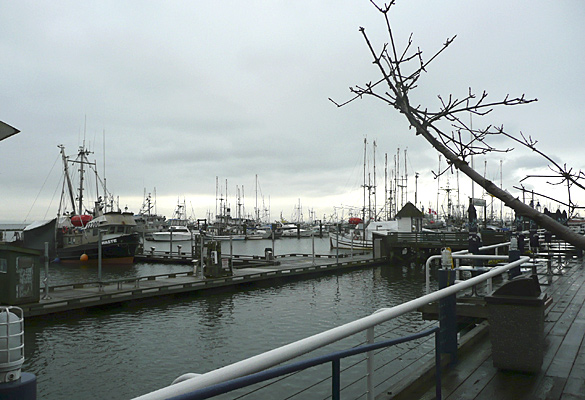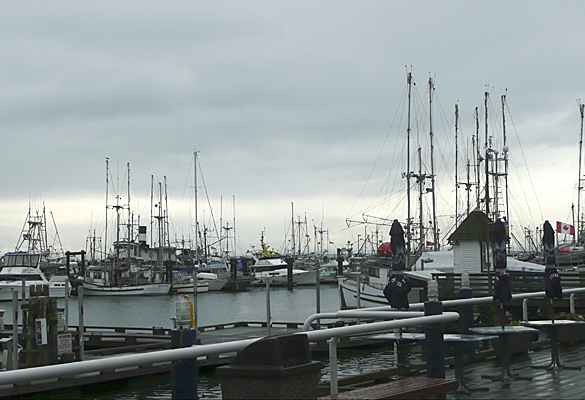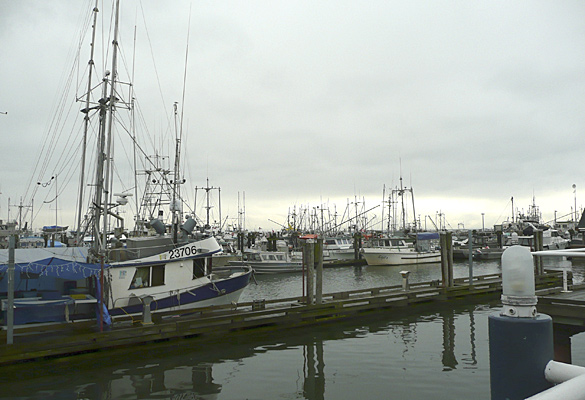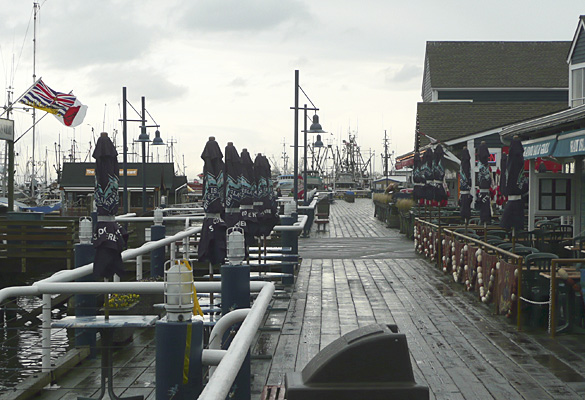in Steveston




Yesterday afternoon we headed out to the old fishing village of Steveston, a part of Richmond (a city south of Vancouver). It was a cool drizzly afternoon with a bit of a chill in the wind as we walked from our car to the Fishermens’ Wharf, located on the south arm of Fraser River. Unlike the very warm sunny day in 2008 when the place was crowded with people strolling on the boardwalk, buying seafood directly off the boats, and dining at the tables outside the many restaurants, it was almost desolate.
We met dear friends who came from out of town for a few days to visit their family and for business. We had great food in one of the surprisingly busy seafood restaurants on this wharf. As we chatted and ate, a couple of huge freighters headed out to sea. It was a heartwarming visit though much too short.
By the time we were driving back home, the rush hour had begun so we decided to wait it out by shopping in a certain Swedish store enroute. (Yay, I found bed and bath linens in a colour I’ve been trying to find for some time.) We dawdled there for a while over coffee, then got bored and decided to tackle the traffic anyway. By this time it was dark and raining very heavily making visibility a challenge. The traffic was terrible and slow but we did make it home safely, tired from the hour’s journey. But it was worth it seeing our good friends for a couple of hours and in such a lovely spot.
February 6, 2013 in Canada and BC by Marja-Leena
What store you mean I think I know…
We started going there in the 70’s. Their first store outside Country of Origin was in Switzerland. I still have bookcases and such we bought there so long ago. Think of that.
I like those moody photos. I find that if it’s not raining and I can walk, I don’t mind the weather in the Northwest that much.
Hattie, when we married and had our first place up north we wished we’d had this Swedish store near us for the choices were poor up there. When we moved here, we were pleased to have more choice. As you have seen, we like the Scandinavian look with some things from there as well as a certain Danish store that is no longer here. Great that you still have those you bought so long ago!
The Northwest really is milder in winter than many parts of the country, and it’s easy to just layer for warmth and rainproof jackets. I’m used to it and don’t miss the prairie winters.
Marja-Leena,
I remember that kinda days in Oregon very well. Sometimes very rarely sun would come up and a human person would have for a short while glimpse of hope. And end up sighing next day again.
What is the situation up there? Is there still professional fishermen enough to make living? At least the fishing harbor looks great.
The fishing has almost ended here in Ostrobotnian coast. We had a friend who was one of the last ones, and now he and his wife ended up moving into the city. He got his pension.
Main catch has been for years so called Baltic Sprat, which is related to herring, but a smaller fish. For some reason people have stopped eating this good and clean fish. Most of it has gone to fur farmers, which in itself is a very doubtful profession: to keep wild animal gaged up just for the fur!
Our parliament will have to take a stand to the petition of ending fur farming. The problem is of course, that what will those people do for their living after that?
Marjatta, the gloomy rainy days can get a person down so it is important to keep busy. At least we don’t have to shovel it and the world is green!
I’m sorry to hear about the fisheries situation in Finland. I’m not an expert but I’ll try to answer though it will be long…
Overfishing is a huge problem here and I think there are fewer commercial fishermen than a hundred years ago when there were numerous canneries along the coast. Still there are a lot of fishermen. There are catch limits and seasons in which each variety of fish is allowed to be caught, salmon being the largest. So the boats may be idle between seasons. Some years when the salmon runs are low, the fishermen are unhappy with the greater restrictions.
There are serious concerns with fish farming with a non-native species which is spreading disease to the wild salmon. You may have heard about the death of the cod fishery on our Atlantic coast – this is what we fear here on the west coast for our salmon. A lot of our seafood goes to Asia as well as our own market. Sport fishing is big business too, so between overfishing and disease and environmental issues with the rivers, the salmon numbers are dropping. And so will the number of fishermen. Our First Nations people who depend on fish are impacted.
Meanwhile our government does not care about the environment.
Sorry, readers, we have gone off topic and this is too much information….
Marja-Leena,
thanks! I wish that the governments would have the wisdom to make it possible for our children and their children to continue to live – wherever.
It does look a bit gloomy.
I do remember fish harbors in most of the places I’ve lived: Pori, Helsinki, Stockholm, Tampere (that has big lakes) and now Vaasa. We used to have a lot of good and fresh fish.
Not anymore.
There are still good an clean waters on the Arctic Sea. Maybe they manage to save them.
The photographs are beautiful but living as I do on the opposite coast where similar scenes are common I understand and empathize with the great sadness we feel about our seas. Overfishing, driftnets, and pollution of all kinds are killing this greatest resource and natural wonder. Sometimes even Crow feels to sad to write about things he can’t change. Meanwhile, watching the gulls crack shellfish on the rocks is still our greatest pleasure. Some of the crows have learned how to do it too.
Susan, it really is all very sad! Thanks for adding your voice.